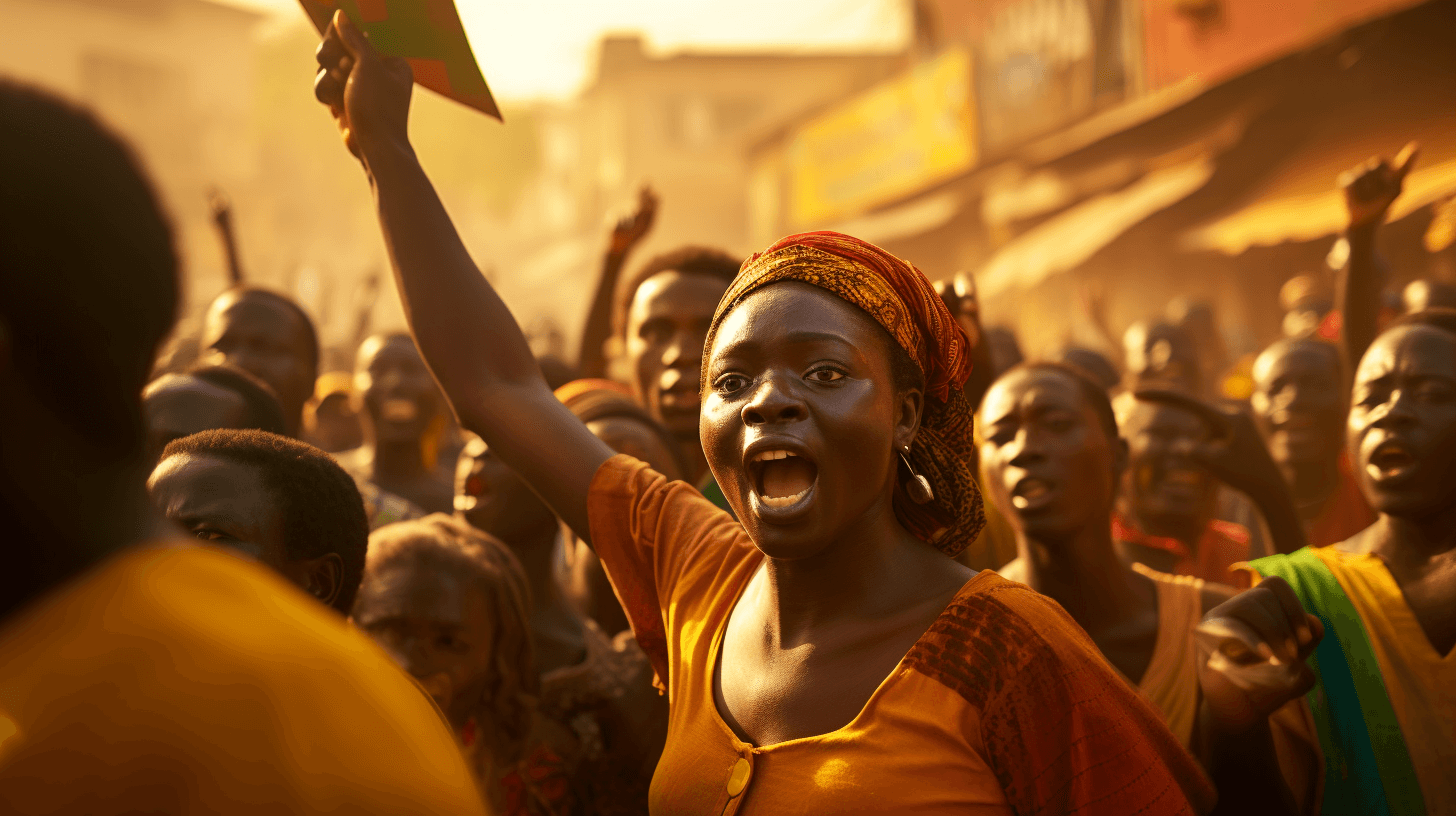💉👧 Plenny Kala, Rubbah Slippah Talk, an’ One Spooky Kine Rumors: Howzit Tanzania Protecting Da Wahines From HPV? 🌍
So da kine problem o’ cervical cancer stay pretty bad, an’ da worse part stay happening inside dem countries wea money stay tight, an’ Tanzania stay tryna help da keiki wahines by shooting dem wit one vaccine fo’ da kine HPV virus dat make dis cancer come. Dis stay happen like 20 years afta da kine rich countries already start shooting da vaccine. 💰🏥🌺
Da health workers come down to da Upendo Primary School right by da Tanzania capital, an’ dey tell all da wahines who goin’ turn 14 dis year fo’ make line fo’ get one shot. One wahine, Quinn Chengo, start whispering to her sistahs: What dis shot fo’, yeah? Maybe one Covid vaccine? Or maybe one shot fo’ keep dem from having keiki? 🏫💭💡
Chengo stay lil’ bit nervous, but she remember her sistah got da same shot last year fo’ da HPV virus, so she go make line. But some wahines, dey stay sneak away, hide behind da school buildings. Den when dey come home dat night, dey parents all asking kine questions, thinking maybe dis shot goin’ make dey keiki feel more okay about da kine sexy time stuff. 💉🏃♀️🙅♀️
Da HPV vaccine, dat stay protect dem from da sexually transmitted virus dat make cervical cancer, been given to da adolescents in da United States an’ odda industrial countries fo’ about 20 years now. But only now, dem lower-income countries starting fo’ introduce um more widely, an’ inside places like dis, 90 percent of cervical cancer deaths happen. 🌎💊📈
Da way Tanzania handling dis, wit all kine wrong information, wit culture an’ religion making discomfort, an’ wit problems getting enough vaccines an’ making sure dey get to da right place, show how hard it stay fo’ countries fo’ make one health intervention dat stay super important fo’ dis region. Da screening an’ treatment fo’ cancer stay limited inside Tanzania; dis shot could cut down da deaths from cervical cancer big time, which stay da most deadly cancer fo’ da Tanzanian wahines. 🇹🇿🔍🚑
Da HPV vaccination efforts been getting all kine problems across Africa fo’ many years. Many countries been tryna start programs in 2018, working wit Gavi, one global organization dat stay help low-income nations wit vaccines. But Gavi no can get shots fo’ dem. Inside da United States, da HPV vaccine cost about $250; but Gavi, who usually make big discounts from da drug companies, was tryna pay only $3 to $5 per shot fo’ da big amount of vaccine dey wanted. But cause da rich countries also was expanding dey programs, da vaccine makers — Merck an’ GlaxoSmithKline — dey focus on those markets, no leave much fo’ da developing countries. 💸🌍💔
Den dis kine Covid pandemic go make everything mo’ complicated fo’ da HPV campaign, cause it mess up da health systems, make schools close, an’ make people even mo’ scared fo’ get vaccines. “Parents pull kids out of school when dey hear da vaccination is coming,” says Khalila Mbowe, who stay running da Tanzania office of Girl Effect, one NGO dat stay funded by Gavi fo’ make more demand fo’ da vaccine. “Afta Covid, all kine things about vaccination stay even mo’ charged.” 🦠🔒😷
Even wit all da problems, Tanzania stay able fo’ shoot almost three-quarters of its 14-year-old wahines in 2021 wit da first dose. (Tanzania got to dat target fo’ first-dose coverage two times faster den da United States.) But it stay harder fo’ make people come back fo’ da second dose: only 57 percent got da second shot six months later. One same kine gap stay happening in most sub-Saharan countries dat started da HPV vaccination. 🗓️⚕️💪
Since Tanzania mostly been using school pop-up clinics fo’ shoot da shots, some wahines miss da second dose cause dey no stay school anymore by da time da health workers come back. Rahma Said got her vaccine at school in 2019, when she was 14. But not long afta, she no can pass da exams fo’ go up to secondary school an’ she drop out. Said tried couple times fo’ get one second shot at public health clinics in her neighborhood, but none of dem had da vaccine, an’ last year, she say, she give up. 🏚️🏥📚
Next year, Tanzania probably go switch to one single-dose regimen, Dr. Tinuga say. More an’ more evidence stay showing dat one single shot of da HPV vaccine can give plenty protection, an’ in 2022 da W.H.O. recommend dat countries switch to one one-dose campaign, which would help wit costs an’ vaccine supply, an’ no need try an’ shoot da wahines one second time. 🌍👩⚕️💡
One odda way fo’ save money, public health experts say, would be fo’ move from school-based vaccination to making da HPV shot one of da routine vaccines offered at health centers. Making dis kine change goin’ take plenty big an’ long-lasting public education effort. “We get fo’ make sure demand stay very, very strong cause dey not typically goin’ come to facilities fo’ odda interventions,” Ms. Nguyen of Gavi say. 💉🏫🏪
NOW IN ENGLISH
💉👧 Money, Talk, and Rumors: Tanzania’s Fight to Shield Girls from HPV 🌍
The grave issue of cervical cancer is mainly concentrated in economically strained countries. Tanzania is attempting to safeguard its young girls by providing vaccinations against the Human Papillomavirus (HPV) that causes this disease. This initiative comes two decades after wealthier nations began their vaccination programs. 💰🏥🌺
Healthcare workers visited Upendo Primary School on the outskirts of the Tanzanian capital. They instructed girls who were turning 14 this year to queue for a vaccination. One girl, Quinn Chengo, began quietly discussing with her peers: What was this vaccination for? Could it be a Covid vaccine? Or perhaps a birth control shot? 🏫💭💡
Chengo was slightly apprehensive, but she recalled that her sister received the same HPV vaccination the previous year. So, she joined the queue. Some girls, however, sneaked away and hid behind school buildings. When they returned home that evening, they faced their parents’ queries, worried that the vaccine might make their daughters more comfortable with the idea of sex. 💉🏃♀️🙅♀️
The HPV vaccine, which provides almost total protection against the sexually transmitted virus causing cervical cancer, has been administered to teenagers in the United States and other developed nations for nearly two decades. However, its widespread introduction in lower-income countries is recent, where 90 percent of cervical cancer-related deaths occur. 🌎💊📈
Tanzania’s struggles with misinformation, cultural and religious discomfort, and logistical obstacles to the supply of vaccines underscore the challenges countries face in implementing crucial health interventions in these regions. Screening and treatment for cancer are limited in Tanzania; the vaccine could drastically reduce deaths from cervical cancer, the deadliest cancer for Tanzanian women. 🇹🇿🔍🚑
Efforts to vaccinate against HPV have faced hurdles across Africa for years. Many countries planned to start programs in 2018 in collaboration with Gavi, a global organization aiding low-income nations with vaccinations. But Gavi was unable to secure vaccinations for them. In the US, the HPV vaccine costs about $250; Gavi, typically negotiating significant discounts with pharmaceutical companies, aimed to pay only $3 to $5 per shot. However, as wealthier nations were expanding their programs, vaccine manufacturers — Merck and GlaxoSmithKline — focused on those markets, leaving little for developing countries. 💸🌍💔
The Covid pandemic added further complexity to the HPV campaign, disrupting health systems, causing school closures, and escalating vaccine hesitancy. “Parents pull their kids out of school when they hear that vaccinations are coming,” says Khalila Mbowe, who heads the Tanzania office of Girl Effect, a non-governmental organization funded by Gavi. “After Covid, issues about vaccination are even more pronounced.” 🦠🔒😷
Despite these obstacles, Tanzania managed to vaccinate nearly three-quarters of its 14-year-old girls in 2021 with a first dose. (Tanzania achieved this first-dose coverage goal twice as quickly as the United States.) Persuading people to return for a second dose has been more challenging: only 57 percent received the second shot six months later. A similar trend is evident in most sub-Saharan countries that have initiated HPV vaccination. 🗓️⚕️💪
Since Tanzania has largely relied on school pop-up clinics for vaccinations, some girls miss the second dose because they’ve left school by the time health workers return. Rahma Said received her vaccination at school in 2019, when she was 14. However, shortly after, she failed her exams to transition to secondary school and dropped out. Said attempted a few times to get a second shot at public health clinics in her neighborhood, but none had the vaccine, and last year, she said, she gave up. 🏚️🏥📚
Next year, Tanzania is likely to switch to a single-dose regimen, says Dr. Tinuga. There’s increasing evidence that a single shot of the HPV vaccine will provide sufficient protection. In 2022, the World Health Organization (W.H.O.) recommended that countries switch to a one-dose campaign, which would improve costs and vaccine supply and eliminate the challenge of vaccinating girls a second time. 🌍👩⚕️💡
Another cost-saving measure, public health experts suggest, would be to transition from school-based vaccinations to making the HPV shot one of the routine vaccines offered at health centers. Such a shift will require an extensive and sustained public education effort. “We have to ensure that demand is very, very strong because they’re not typically going to visit facilities for other interventions,” says Ms. Nguyen of Gavi. 💉🏫🏪







